3.词义的选择与引申作业及答案
- 格式:doc
- 大小:29.50 KB
- 文档页数:1
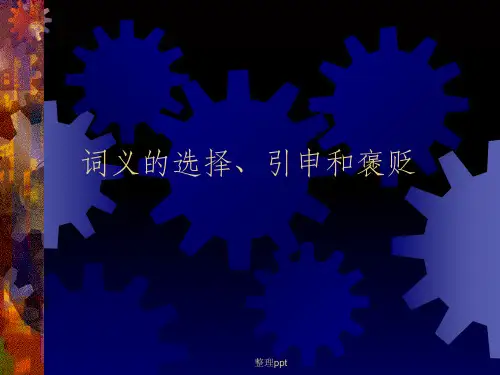
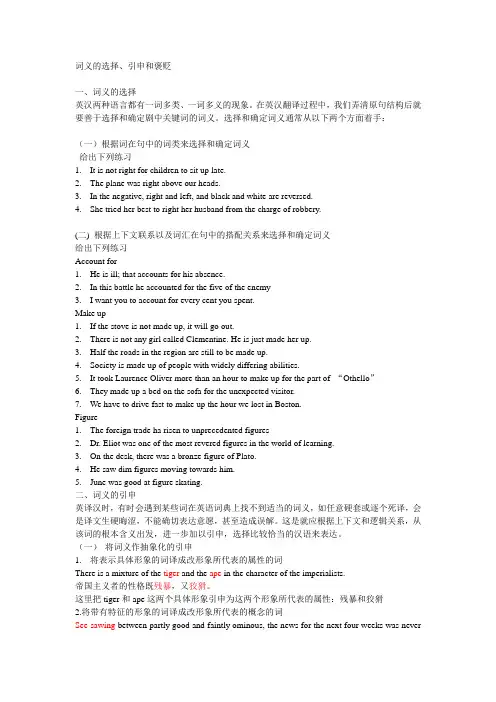
词义的选择、引申和褒贬一、词义的选择英汉两种语言都有一词多类、一词多义的现象。
在英汉翻译过程中,我们弄清原句结构后就要善于选择和确定剧中关键词的词义。
选择和确定词义通常从以下两个方面着手:(一)根据词在句中的词类来选择和确定词义给出下列练习1.It is not right for children to sit up late.2.The plane was right above our heads.3.In the negative, right and left, and black and white are reversed.4.She tried her best to right her husband from the charge of robbery.(二) 根据上下文联系以及词汇在句中的搭配关系来选择和确定词义给出下列练习Account for1.He is ill; that accounts for his absence.2.In this battle he accounted for the five of the enemy3.I want you to account for every cent you spent.Make up1.If the stove is not made up, it will go out.2.There is not any girl called Clementine. He is just made her up.3.Half the roads in the region are still to be made up.4.Society is made up of people with widely differing abilities.5.It took Laurence Oliver more than an hour to make up for the part of “Othello”6.They made up a bed on the sofa for the unexpected visitor.7.We have to drive fast to make up the hour we lost in Boston.Figure1.The foreign trade ha risen to unprecedented figures2.Dr. Eliot was one of the most revered figures in the world of learning.3.On the desk, there was a bronze figure of Plato.4.He saw dim figures moving towards him.5.June was good at figure skating.二、词义的引申英译汉时,有时会遇到某些词在英语词典上找不到适当的词义,如任意硬套或逐个死译,会是译文生硬晦涩,不能确切表达意愿,甚至造成误解。
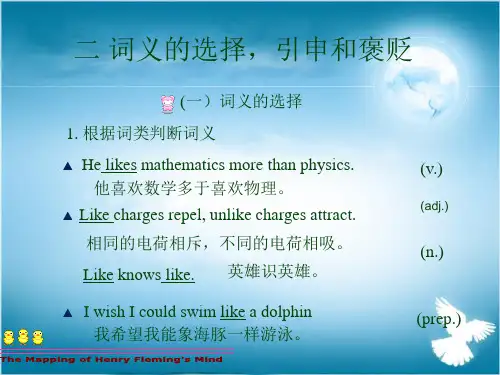
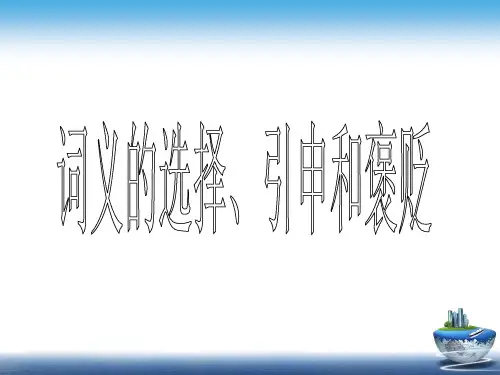


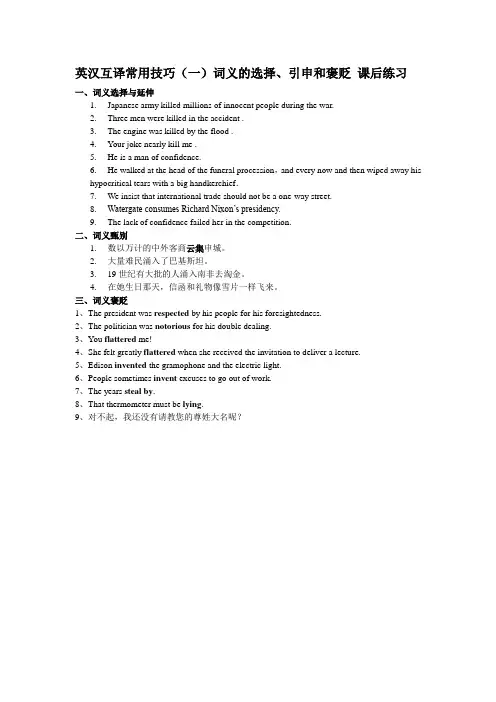
英汉互译常用技巧(一)词义的选择、引申和褒贬课后练习一、词义选择与延伸1.Japanese army killed millions of innocent people during the war.2.Three men were killed in the accident .3.The engine was killed by the flood .4.Y our joke nearly kill me .5.He is a man of confidence.6.He walked at the head of the funeral procession,and every now and then wiped away hishypocritical tears with a big handkerchief.7.We insist that international trade should not be a one-way street.8.Watergate consumes Richard Nixon’s presidency.9.The lack of confidence failed her in the competition.二、词义甄别1.数以万计的中外客商云集申城。
2.大量难民涌入了巴基斯坦。
3.19世纪有大批的人涌入南非去淘金。
4.在她生日那天,信函和礼物像雪片一样飞来。
三、词义褒贬1、The president was respected by his people for his foresightedness.2、The politician was notorious for his double dealing.3、Y ou flattered me!4、She felt greatly flattered when she received the invitation to deliver a lecture.5、Edison invented the gramophone and the electric light.6、People sometimes invent excuses to go out of work.7、The years steal by.8、That thermometer must be lying.9、对不起,我还没有请教您的尊姓大名呢?段落练习:A Translate the underlined part of the following text into English.我想不起来哪一个熟人没有手机。
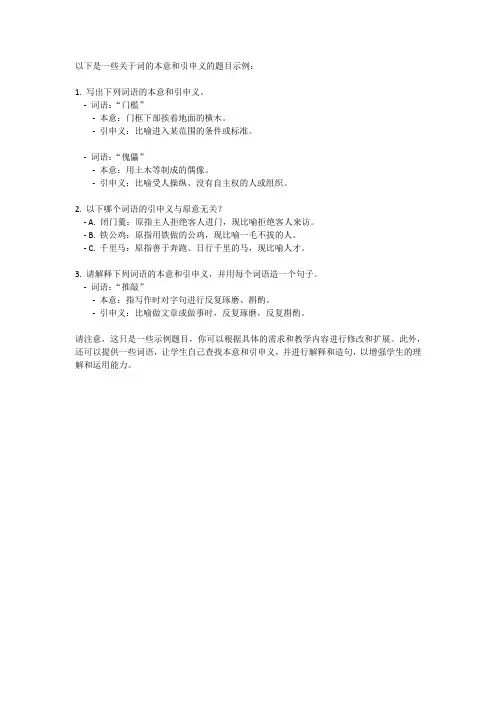
以下是一些关于词的本意和引申义的题目示例:
1. 写出下列词语的本意和引申义。
-词语:“门槛”
-本意:门框下部挨着地面的横木。
-引申义:比喻进入某范围的条件或标准。
-词语:“傀儡”
-本意:用土木等制成的偶像。
-引申义:比喻受人操纵、没有自主权的人或组织。
2. 以下哪个词语的引申义与原意无关?
- A. 闭门羹:原指主人拒绝客人进门,现比喻拒绝客人来访。
- B. 铁公鸡:原指用铁做的公鸡,现比喻一毛不拔的人。
- C. 千里马:原指善于奔跑、日行千里的马,现比喻人才。
3. 请解释下列词语的本意和引申义,并用每个词语造一个句子。
-词语:“推敲”
-本意:指写作时对字句进行反复琢磨、斟酌。
-引申义:比喻做文章或做事时,反复琢磨,反复斟酌。
请注意,这只是一些示例题目,你可以根据具体的需求和教学内容进行修改和扩展。
此外,还可以提供一些词语,让学生自己查找本意和引申义,并进行解释和造句,以增强学生的理解和运用能力。
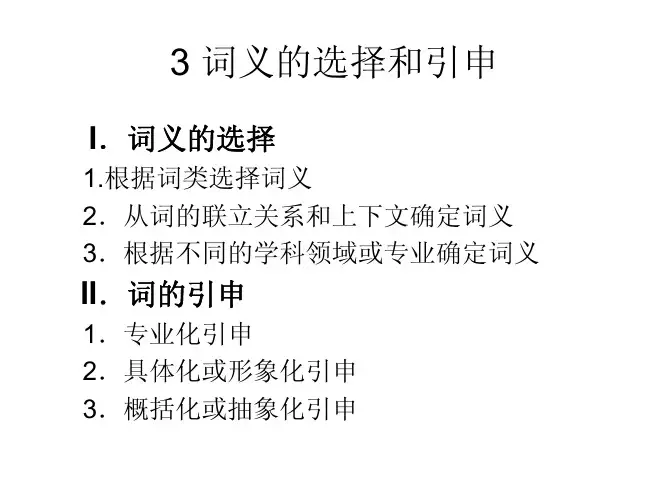
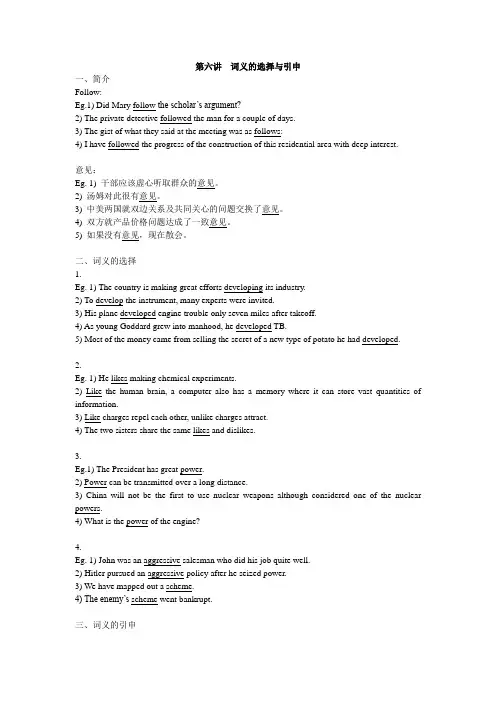
第六讲词义的选择与引申一、简介Follow:Eg.1) Did Mary follow the scholar’s argument?2) The private detective followed the man for a couple of days.3) The gist of what they said at the meeting was as follows:4) I have followed the progress of the construction of this residential area with deep interest.意见:Eg. 1) 干部应该虚心听取群众的意见。
2) 汤姆对此很有意见。
3) 中美两国就双边关系及共同关心的问题交换了意见。
4) 双方就产品价格问题达成了一致意见。
5) 如果没有意见,现在散会。
二、词义的选择1.Eg. 1) The country is making great efforts developing its industry.2) To develop the instrument, many experts were invited.3) His plane developed engine trouble only seven miles after takeoff.4) As young Goddard grew into manhood, he developed TB.5) Most of the money came from selling the secret of a new type of potato he had developed.2.Eg. 1) He likes making chemical experiments.2) Like the human brain, a computer also has a memory where it can store vast quantities of information.3) Like charges repel each other, unlike charges attract.4) The two sisters share the same likes and dislikes.3.Eg.1) The President has great power.2) Power can be transmitted over a long distance.3) China will not be the first to use nuclear weapons although considered one of the nuclear powers.4) What is the power of the engine?4.Eg. 1) John was an aggressive salesman who did his job quite well.2) Hitler pursued an aggressive policy after he seized power.3) We have mapped out a scheme.4) The enemy’s scheme went bankrupt.三、词义的引申1. 具体词语抽象化Eg. 1) Everyone has rain and sunshine (roses and thorns) in their life.2) The character of these imperialists is a mixture of the tiger and the ape.3) Among so many well-dressed and cultivated people, the country girl felt like a fish out of water.4) We insist that international trade should not be a one-way street.2. 抽象词语具体化Eg. 1) The car in front of me suddenly stopped and I missed the green.2) Public opinion demands that something should be done to end the strike.3) What they wanted was an end of uncertainties.3. 改换说法Eg. 1) A divorced woman is likely to find herself in an unenviable position.2) He is always ahead of his salary.3) The shortest distance between raw material and a finished part is casting.4) The alternating current does not know such a disadvantage as the direct current does.四、汉英翻译中的词义选择和引申:1)他这个人真够意思。
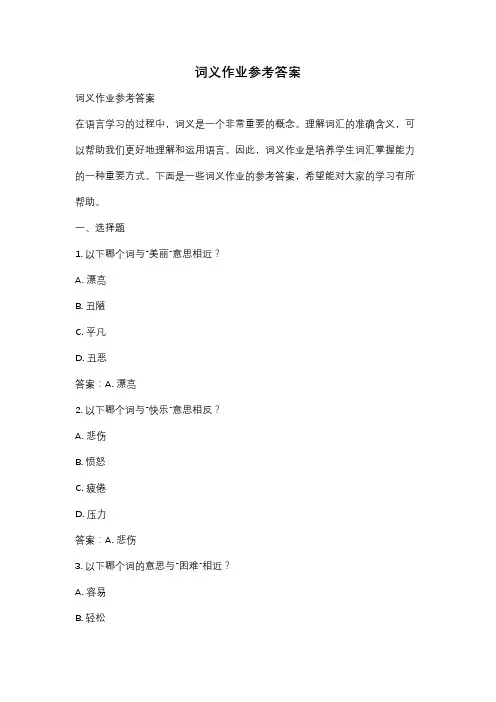
词义作业参考答案词义作业参考答案在语言学习的过程中,词义是一个非常重要的概念。
理解词汇的准确含义,可以帮助我们更好地理解和运用语言。
因此,词义作业是培养学生词汇掌握能力的一种重要方式。
下面是一些词义作业的参考答案,希望能对大家的学习有所帮助。
一、选择题1. 以下哪个词与“美丽”意思相近?A. 漂亮B. 丑陋C. 平凡D. 丑恶答案:A. 漂亮2. 以下哪个词与“快乐”意思相反?A. 悲伤B. 愤怒C. 疲倦D. 压力答案:A. 悲伤3. 以下哪个词的意思与“困难”相近?A. 容易B. 轻松C. 挑战D. 顺利答案:C. 挑战二、填空题1. 这个词的意思是__________。
答案:根据具体的填空题目填写相应的词义。
三、解释题1. 解释以下词语的意思:勇敢、慷慨、谦虚。
答案:勇敢:不怕困难,有胆量去面对和应对困难的品质。
慷慨:乐于助人,大方地给予的品质。
谦虚:不自大,不自负,虚心谦逊的品质。
2. 解释以下词语的意思:自由、公正、和平。
答案:自由:不受限制,能够自由选择和行动的状态。
公正:按照公平、公正的原则行事,不偏袒任何一方的品质。
和平:没有战争和冲突,人们之间和谐相处的状态。
四、配对题将左边的词语与右边的词义进行配对。
1. 自信 A. 意志坚定,不屈不挠2. 热情 B. 有信心,对自己有信任3. 坚强 C. 热心,充满激情4. 耐心 D. 能够忍耐,不急躁答案:1-B,2-C,3-A,4-D五、应用题根据下面的句子,选择合适的词语填空。
1. 他的演讲充满了_______和_______,赢得了观众的掌声。
答案:热情和激情2. 在困难的时候,我们应该保持_______和_______,不轻易放弃。
答案:坚强和毅力3. 他的态度非常_______,总是愿意帮助别人。
答案:慷慨通过以上的词义作业参考答案,我们可以看到不同词语之间的关联和差异。
掌握词义对于语言学习和表达能力的提升具有重要意义。
希望这些参考答案能够帮助大家更好地理解和运用词汇,提高语言水平。
第六讲词义的选择和引申请看下面几个英文句子及其译文,体会词义选择技巧的运用。
1.The pilot turned the plane around and headed for home.A.飞行员掉转机头,朝家飞去。
B.飞行员掉转机头,朝基地飞去。
2.These were all labeled as good eggs.A.这些鸡蛋都贴有好鸡蛋的标签。
B.这些鸡蛋都贴有新鲜鸡蛋的标签。
3.Their success is a challenge to my efforts.A.他们的成功对我做出的努力是一个挑战。
B.他们的成功鞭策我做出努力。
4.I left my golf clubs and two bottles of brandy inside the car.A.我把高尔夫俱乐部还有两瓶白兰地酒遗忘在车里了。
B.我把高尔夫球杆还有两瓶白兰地酒遗忘在车里了。
一.词义的选择一般来说,词义主要分为语法词义、语境词义和搭配词义,翻译时要根据词语在语法、语境和搭配方面的实际情况,来选择符合原文意思并符合汉语表达习惯的词义。
(一) 语法词义根据语法来判断单词在句子中的词性,然后选择和确定其词义,即先确定单词在句子中属于哪一词性,然后根据词性,正确选择词义。
1.Each cable-car can seat up to six persons.2.Since you are so close, please close the door.3.My father is a regular in that restaurant, and all of the waiters know him.4.John has a surprise in store for him when he gets home tonight.5.The police are asking the public to help them find the two dangerous bank robbers.6.Eat what you can and can what you cannot.7.He saw a man sawing trees with a saw.8.The pigeon homed from a distance of 100 miles.\9.The sellers apparently admitted their fault, but refused to pay damages.(二) 语境词义根据单词在上下文语境的意义来选择和确定词义。
Translate the following sentences into Chinese:(Pay attention to the underlined words)1.The foreign trade has risen to unprecedented figures.对外贸易额有了空前的增长。
2.Dr. Smith was one of the most revered figures in the world of learning.史密斯博士是学术界最受尊敬的人物之一。
3.On the desk there was a bronze figure of Plato.书桌上有一尊柏拉图的铜像。
4.He saw dim figures moving towards him.他隐隐约约看见一些人影在向他跟前移动。
5.June was good at figure skating.琼善于花样滑冰。
6.She is a girl with good manners.她是一位举止得体的姑娘(她是一位有礼貌的姑娘)。
7.Dogs are often regarded as man’s good friends.狗被看作人们忠实的朋友。
8.He was a good chess player.他是一位高明的棋手。
9.These are all labeled as good eggs.这些都被称为新鲜的鸡蛋。
10.Not a day did he spend without having some unpleasantness with his wife.他没有一天不和妻子发生争执的。
11.I don’t trust her. She’s always on the mask and her artificial smiles make me sick.我不信任她。
她总是那么虚伪;那副矫揉造作的笑容令我作呕。
词义的选择和引申英译汉时,大量的工作是从汉语中选择恰当的词来表达英文中的词义。
英国语言学家弗思(J. R. Firth)说:Each word when used in a new context is a new word(每个词用于新的上下文中,就成为一个新词)。
林语堂(1938)针对汉语有过类似的论述:“字义是活的,每每因在文中的用法而变化”,“凡要明字义之人,必求之于全句文中,非咬文嚼字或区区靠字典上的界说定义所能明白的,”而且,“字愈常用愈简单,则其用法愈繁复。
”因而,翻译时不能拘泥于原词的表面意义,或英汉词典中所给的意义,而要根据上下文悉心揣摩这个词在原文中的特定含义,选择符合汉语习惯的对应词,这是确切忠实地用汉语表达原文的一个基本环节。
一般说来,选择和确定词类可以从以下三方面着手:1.1 根据词类确定词义选择词义,首先要判明一个词在句中属于哪一种词类,起什么作用,然后再根据词类选择适当的词义。
例如:up在下列例句中所属词类不同,词义也就不同:例1. What are you doing up there? 你在那边做什么?He is (well) up in mathematics. 他精通数学。
【评析】以上两例中up为副词。
例2. They went up wind. 他们迎风而行。
The ship is sailing up the river. 这船正向河的上游航行。
【评析】以上两例up为介词。
例3. The new museum is up and opens to the public. 新博物馆已落成开放。
When will the up train start? 上行车何时开行?【评析】以上两例中up为形容词。
例4. The landlord promised his tenants there would be no further ups this year. 房东向房客们保证今年不再提高房租。
1.试译下列各短语,注意词的多义性和搭配能力的不同:
1)
• 1.soft pillow 2.soft music
• 3.soft cushion 4.soft wood
• 5.soft money 6.soft drink
•7.soft breeze 8.soft light
•9.soft voice 10.soft fire
•11.soft hat 12.soft words
•13.soft answer 14.soft goods
15.soft heart 16.soft water
•1、软枕;2、轻柔的音乐;
•3、靠垫;4、软木;
•5、纸币;6、不含酒精的饮料;
•7、和风;8、柔光;
•9、低声;10、文火;
•11、呢帽;12、和蔼的话;
•13、委婉的回答;14、毛织品;
•15、易感动之心,慈心;16、软水(不含矿物盐类而易溶解肥皂的水)2)开门open the door 开口open mouth
开火open fire 开刀operate
开发develop 开工begin,start
开会hold/attend/have a meeting
开胃work up/promote/prepare appetite
开心be/feel happy, rejoice
开玩笑play a joke
开花blossom
开车to drive a car 开船to set sail
开机器to start a machine
2.试译下列句子,注意词的引申与褒贬:
1)具体词语抽象化
1. The character of these people is a mixture of the tiger and the ape.
帝国主义者的性格即残暴,又狡猾
2)抽象的词义具体化
• 1. Public opinion demands that something should be done to end the strike.
•众舆论要求采取措施结束罢工。
• 2. The car in front of me suddenly stopped and I missed the green.
•我前面的那辆车突然停了,我错过了绿灯
3)词义的褒贬
1. Mr Brown felt greatly flattered when he received the invitation to deliver a lecture.
【译文】布朗先生接到作演讲的邀请,感到非常荣幸。
(褒)
2. The enemy killed one of our comrades, and we killed an enemy agent.
译文】敌人杀害了我们一位同志,(褒)我们宰了一个特务。
(贬)。